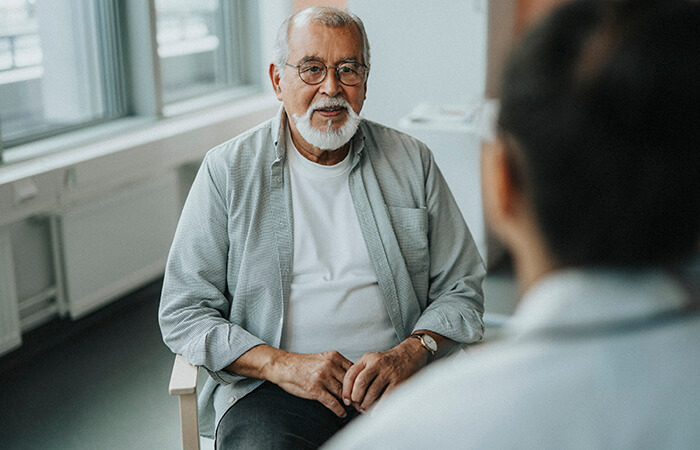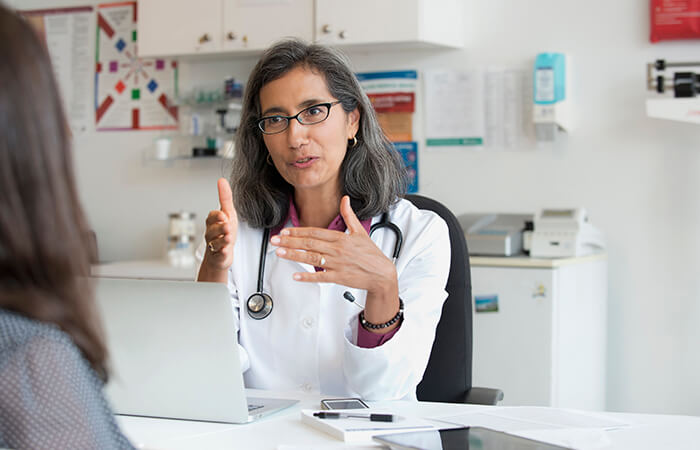

A different approach to treating IBD
When you come to Prevea you can expect that we'll do everything we can to help identify whether you have IBD and if you do, to help get it under control.At your appointment, you'll meet with a provider who will talk to you about your symptoms, discuss your medical history and guide you through testing to help make a diagnosis. There is no one test used to diagnose IBD, but we have access to a variety of tests to check for it. Once diagnosed, we'll work with you to identify a treatment plan that is right for you and your lifestyle. We will help control your IBD so it does not control you.
Inflammatory Bowel Disease Center
Prevea is the only health system in the area with an IBD center that is dedicated to patients with Crohn’s disease and ulcerative colitis. Our goal is to improve the quality of life for those affected by IBD. We pride ourselves on engaging in shared decision making between the patient and provider for diagnosis, treatment and management. The center is a collaboration of physicians, advanced practice providers, colorectal surgeons, pathologists, case managers, nursing teams and infusion therapy centers.We’re here when you need us. Message your provider using MyPrevea or schedule an appointment online. You also have access to the GI Buddy Tool from Crohn’s and Colitis Foundation which gives you the ability to manage and track all aspects of your disease and create a comprehensive view of disease impact including symptoms, treatment, diet and lifestyle. Our care manager also works in conjunction with the Crohn's and Colitis Foundation –Wisconsin Chapter to provide a monthly support group.
What is inflammatory bowel diseases (IBD)?
You may have heard of Crohn's disease or ulcerative colitis. These are two inflammatory bowel diseases which cause inflammation of the lining of your digestive tract and can lead to abdominal pain, severe diarrhea and even malnutrition. The inflammation caused by Crohn's disease can affect all layers and any part of the bowel. Ulcerative colitis only affects the large intestine.Resources for Crohn's and Colitis:
Crohn's & Colitis Foundation of America
Symptoms
Signs and symptoms are similar for both. They can range from mild to severe and may develop gradually or come on suddenly, without warning. You may also have periods of time when you have no signs or symptoms (otherwise known as remission).- Diarrhea
- Abdominal pain and cramping
- Blood in your stool
- Ulcers in intestinal walls and sometimes in your mouth (like canker sores)
- Reduced appetite and weight loss
- Fever
- Fatigue
- Arthritis
- Eye inflammation
- Skin disorders
- Inflammation of the liver or bile ducts
- Delayed growth or sexual development, in children
Causes
The exact cause remains unknown. Previously, diet and stress were suspected, but now doctors know that although these factors may aggravate these diseases, they don't cause it. Researchers believe that a number of factors, such as heredity and a malfunctioning immune system play a role.- Immune system. It's possible that a virus or bacterium may be the cause. When your immune system tries to fight off the invading microorganism, the digestive tract becomes inflamed. Currently, many investigators believe that some people develop either disease because of an abnormal immune response to bacteria that normally live in the intestine.
- Heredity. Mutations in a gene called NOD2 tend to occur frequently in people with either disease and seem to be associated with a higher likelihood of needing surgery. Scientists continue to search for other genetic mutations that might play a role.
Diagnosis
Your doctor will likely diagnose the condition only after ruling out other possible causes for your signs and symptoms, including irritable bowel syndrome (IBS), diverticulitis and colon cancer. To help confirm a diagnosis, you may have one or more of the following tests and procedures:- Blood tests
- Colonoscopy
- Flexible sigmoidoscopy
- Small bowel imaging
- Computerized tomography (CT)
- Capsule endoscopy
Treatment
Treatment may include medications, surgery, nutrition supplementation or a combination of these options. The goals of treatment are to control inflammation, correct nutritional deficiencies, and relieve symptoms such as abdominal pain, diarrhea and rectal bleeding. Treatment depends on its location, severity and complications.Treatment can help control symptoms and make recurrences less frequent, but no cure exists. Someone may need long-lasting medical care and regular doctor visits to monitor the condition. Some people have long periods—sometimes years—of remission when they are free of symptoms, and predicting when a remission may occur or when symptoms will return is not possible.
Despite possible hospitalizations and the need to take medication for long periods of time, most people live full lives—balancing families, careers and activities.
Diet and Nutrition
- Ask your doctor about extra vitamins and minerals you may need.
- Eat small amounts of food throughout the day.
- Drink lots of water (drink small amounts often throughout the day).
- When in a flare, avoid high-fiber foods (bran, beans, nuts, seeds and popcorn).
- Avoid fatty, greasy or fried foods and sauces (butter, margarine and heavy cream).
- If your body does not digest dairy foods well, limit dairy products. Try low-lactose cheeses, such as Swiss and cheddar, and an enzyme product, such as Lactaid, to help break down lactose.
- Avoid foods that you know cause gas, such as beans, spicy food, cabbage, broccoli, cauliflower, raw fruit juices and fruits -- especially citrus fruits.
- People who have a blockage of the intestines may need to avoid raw fruits and vegetables and other high-fiber foods.
- Take iron supplements (if you are anemic).
- Take calcium and vitamin D supplements to help keep your bones strong.
- If there is vitamin B12 deficiency, you may need to take a supplement to prevent anemia.
Reduce stress with the following:
- Exercise
- Biofeedback. This stress-reduction technique helps you reduce muscle tension and slow your heart rate with the help of a feedback machine. You're then taught how to produce these changes yourself. The goal is to help you enter a relaxed state so that you can cope more easily with stress. Biofeedback is usually taught in hospitals and medical centers.
- Regular relaxation and breathing exercises like yoga and meditation
- Hypnosis
- Set aside time every day for any activity you find relaxing — listening to music, reading, playing computer games or just soaking in a warm bath.
Medications
- Fiber supplements may help your symptoms. You can buy psyllium powder (Metamucil) or methylcellulose (Citrucel) without a prescription.
- Aminosalicylates (5-ASAs) are used to help reduce inflammation in the lining of the intestine.
- Corticosteroids are an anti-inflammatory used to decrease inflammation in both the intestine and throughout the body. They are used for short term control of symptoms during acute flare-ups of IBD.
- Medicines such as azathioprine or 6-mercaptopurine quiet the immune system's reaction.
- Antibiotics may be prescribed for abscesses or fistulas.
- Biologic therapy is used to treat patients with moderate to severe cases or symptoms that don’t respond to any other types of medication. Medicines in this group include infliximab (Remicade), and adalimumab (Humira), certolizumab (Cimzia), Vedolizumab (Entyvio), Ustekinumab (Stelara), and Tofacitinib (Xeljanz), ozanimod (Zeposia) or upadacitinib (Rinvoq).
- Take acetaminophen (Tylenol) for mild pain.
- Drugs such as aspirin, ibuprofen (Advil, Motrin), or naproxen (Aleve, Naprosyn) may make your symptoms worse.


.jpg?width=700&height=450&ext=.jpg)
